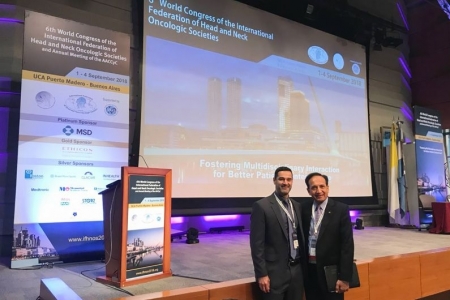26 Setembro de 2018
Professor establishes a less invasive surgical method for oral cancer
With a method that maintains safety but lessens the surgical risks of oral cancer treatment, Univates professor of Medicine Marco Seferin was honored at the 6th World Congress of Head and Neck Surgery. The event took place in early September in Buenos Aires, Argentina, and brought together about two thousand researchers from different countries.
Seferin, who is also the coordinator of the medical surgery department of the Medicine School, explains that often oral cancer affects also lymph nodes, popularly known as "glands," which requires neck surgery.
“The standard procedure for the removal of the "glands" is routine in the treatment of oral cancer, but often these "glands" are not compromised and do not need to be removed, avoiding surgery with a high risk of injury to nerves that move the patients' face and shoulder”, Professor of Medicine at Univates Marco Seferin.
The suggested method is already applied to other types of cancer, such as breast cancer. In oral cancer, only one of the neck's glands is removed and analyzed. If it is not sick, standard surgery becomes unnecessary. "In general, we have the same cure rate of patients with less physical damage. We are currently trying to maintain the same safety with smaller surgical procedures that carry fewer risks", explains Seferin.
The Congress had about 20 honorees, with Seferin being the only Brazilian. "Presenting the work internationally means that we can reach more people. With this we can expand the reach of this type of treatment and reduce the morbidity of patients", says the researcher.
The paper named “The Impact of Sentinel Lymph Node Method in the Quality of life of patients with Oral Cavity Epidermoid Carcinoma” was part of his PhD thesis concluded at the University of São Paulo (USP). The research was guided by researchers of the University of São Paulo, Dr. Cláudio Cernea, Dr. Leandro Mattos and Dr. Fábio Pinto. Currently, according to the professor, the Institute of Cancer of the State of São Paulo (Icesp) instituted the method as routine in the service.
